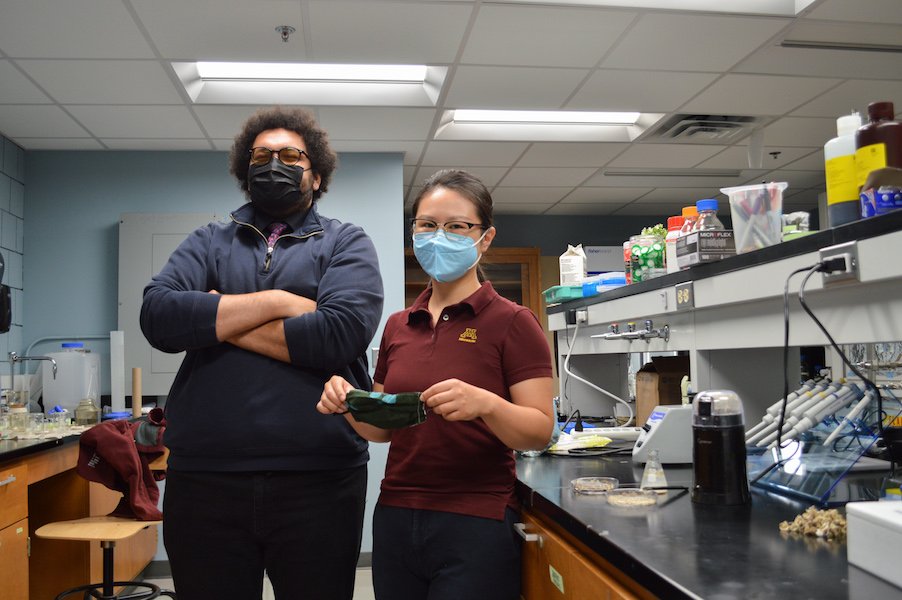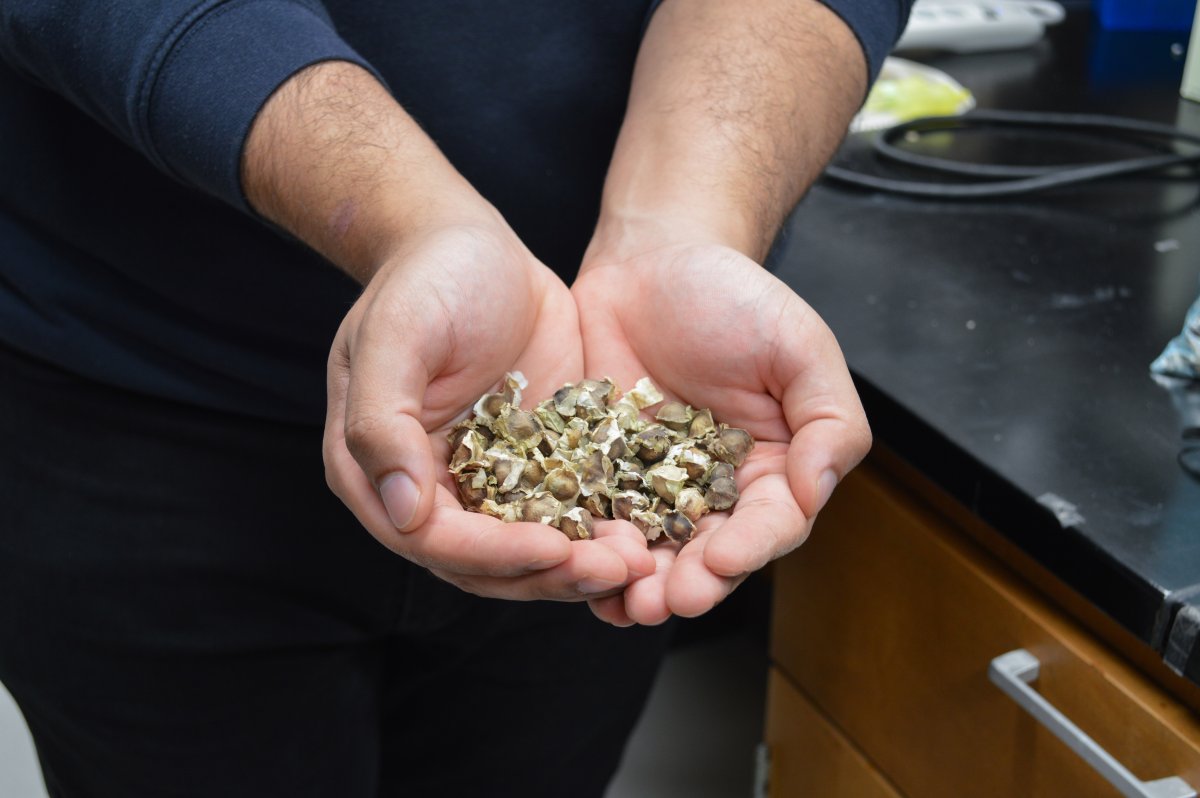Antiviral mask coating could strengthen protection against COVID-19

Top: The coating (pictured in a beaker) is made up of water and ground seeds from the Moringa oleifera tree, a tropical plant whose seeds contain proteins with antimicrobial properties.
DIY solution blocks virus particles from spreading
September 28, 2021
Face masks have shown to be one of the most essential weapons in preventing the transmission of COVID-19. But, although homemade cloth or surgical masks provide some protection, they are nowhere near 100 percent effective. University of Minnesota College of Science and Engineering researchers are trying to change that.
With funding from the Centers for Disease Control (CDC), Assistant Professor Boya Xiong is working on a liquid coating that, when applied to face masks, can remove the COVID-19 virus on contact.
The coating contains only a few ingredients—the main one comes from Moringa oleifera, a tropical tree whose seeds contain antimicrobial proteins that can fend off microorganisms like bacteria and viruses—and can be easily made by the average person at home using a coffee grinder and filter.
“N95 masks are not as available for some citizens since we have to save them for the frontline workers,” explained Xiong, a faculty member in the Department of Civil, Environmental, and Geo- Engineering.
“This project is trying to use the current existing face covering that is very accessible to citizens—even masks that a lot of people make themselves at home—better at removing virus aerosols.”
The miracle seed
Xiong’s lab has been developing methods to extract the antimicrobial proteins from the Moringa seed for some time. Xiong herself was first introduced to the seed as a Ph.D. student at Pennsylvania State University back in 2016 and was fascinated by it as a nature-inspired solution for public health problems.

A few years later, her research team at Penn State coated water filters with the seed’s proteins to help kill bacteria and pathogens in water. Last year after joining the U of M as an assistant professor, Xiong found that the proteins also may have the ability remove the COVID-19 virus. She and her environmental engineering graduate student, Tariq Bastawisy, got to work.
“We wanted to figure out a way to coat the protein onto the textile material that we use for face coverings,” Xiong said.
“Then, when you have virus aerosols in the air, the mask is blocking people from inhaling those aerosols from the surrounding environment. Or, blocking people from emitting those aerosols in the first place.”
The researchers’ ultimate goal is for this antimicrobial coating to become a do-it-yourself project people can complete at home. The process is fairly simple: grind up the Moringa seeds using a coffee grinder, mix the grounds with water, filter out the grounds so only the liquid remains, dip a cloth face mask into the solution for five to 10 minutes, rinse it in water, then let it dry.
Once the mask has been used, the coating can be washed off with salt water and reapplied later. The entire procedure is safe for humans—and environmentally friendly. The coating uses all natural ingredients, compared to other advanced face mask designs that experiment with more expensive and possibly toxic nanomaterials.
“We want to see if the simplest method will make it really effective,” Xiong said.
“If there's a potential that we can have this whole procedure done by citizens at home, it would be a really long-lasting method and an easy, cheap way of getting our coating.”
The official timeline of the project is two years, and the researchers still need to work out the details of the coating process. For example, how effectively does the protein bind to the virus? What is the best ratio of water to seed to make the coating effective? How long does the coating last before you have to wash and reapply it? Would the virus remain deactivated after it’s removed by the coating?
This fall, Xiong’s lab is collaborating with CSE’s Center for Filtration Research to collect and analyze the data to find answers to these questions.
But Xiong plans to try out the coating herself at home to see how it works.
“I have been working on this protein for a while and am really inspired by how wide-ranging its functions can be,” Xiong said. “COVID really affected everybody's life in this world, and transmission has been hard to control. This is one of those solutions that has multiple benefits to society and can also solve a problem that's really critical right now.”
If you’d like to support research in the University of Minnesota College of Science and Engineering, visit our CSE Giving website.
